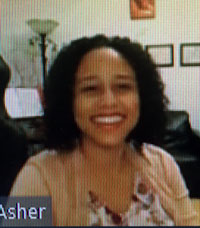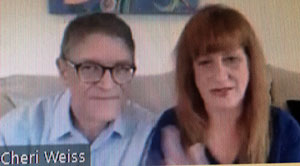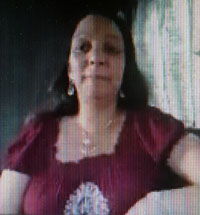
Other items in today’s column include:
*Protecting pet dogs through the summer
*Recommended reading


SAN DIEGO — Being of mixed racial background and also Jewish often feels like no matter what group you are with, you are perceived as the “other,” sometimes prompting doubts if there is any group with which you truly belong. Such was the thrust of comments made by Jessica Lemoine and Jenni Asher during an Internet forum on Sunday sponsored by the San Diego Outreach Synagogue and moderated by Rabbi/ Cantor Cheri Weiss and her husband Dan Weiss.
Asher, a musician with a degree from the Royal Academy of Music in London, is now studying for the cantorate at the Academy of Jewish Religion in California, the same institution at which Rabbi/Cantor Weiss was ordained. Married to a Jew whose family fled Egypt, Asher decided to convert to Judaism first in a Conservative ceremony and later in an Orthodox one. When her 2-year-old daughter grows up, she explained, should she want to marry a religious Jew, she doesn’t want anyone to question the authenticity of her mother’s conversion.
Prior to Asher’s decision to become a Jew by choice, she had been a member of the fundamentalist church, whose members often styled themselves as inheritors of Biblical Judaism. She said she decided to search out “real Jews” and began attending synagogue in London, then continued her exploration of Judaism and eventual conversion in the United States. At first, she said, she welcomed explanations of synagogue rituals from members of the congregations she attended, but after she learned her way through the rituals, she was bothered that people still assumed that she had to be instructed — that because of her skin color, she must not be Jewish. “To be seen as the other, comes as a surprise, when you don’t think of yourself as the other,” she said.
Asher recalled playing violin at a Friday night service, and being asked afterwards by a female congregant, who was White, whether it was true that she was Jewish. The mother explained that her daughter considers herself to be, like Asher, a “Jew of Color.” Asher said anyone who looked at the girl would consider her to be White, no matter her ethnic heritage. “I had to grapple with my feelings: ‘This girl passes, what problems does she have?’ At that point, Asher added, “I realized that I’m as racist as anyone else.” Difficult conversations among people of different race are needed “to recognize these feelings exist.”
Asked if she had ever experienced anti-Semitism, she said she had been challenged by people of her former church, but that the opposition she felt was “different” from the kind of negativity she experiences as a Black person.
As a Black person, she said, she loves the fact that she can go out into the sun, without having to put gobs of sunscreen on her skin, and that from her Black father she inherited a love of music that she enjoys celebrating with her Black friends.
As a Jew, she added, she loves the fact that there is an openness to intellectual disagreement. She described herself as enamored of the idea “that you have to have two opposing opinions to discuss an issue.”
The experience of being Black, she said, has left her with many impressions. She recalls being in the car with her father when police pulled him over, for no apparent reason. “It is definitely a scary thing, feeling that the police are not there for you.”
Asher has cousins on her father’s side, who regard her as the ‘White one,” although her skin color is somewhere between White and Black. Doing some genealogical research, she found that her father’s side traced their roots back to Nigeria. Asher went on to say that she has become fascinated with the Igbo people of Eastern Nigeria, the name “Igbo” perhaps a derivative of “Ivrit” (Hebrew). (There are Igbo who practice Judaism, with large Stars of David marking their villages.) This has prompted Asher to think that perhaps Judaism was in her background even before she went through her two conversions.

Rabbi/ Cantor Cheri Weiss, introducing the Zoom session, commented that it is important to “listen to other people’s stories. Listen to what they have to tell us about their lives, their experiences, their journeys.”
She added: “For centuries, Blacks and Jews have been the target of oppression, bigotry, hatred and murder which continues to this day. Jews and Blacks have experienced such hared and murder differently in our history. We have an opportunity and an obligation to better understand each other’s experiences and perspectives and to cooperate and collaborate in building a community and a world free of bigotry, hatred, oppression and violence against Jews, Blacks, all people of color, LBGTQ people, and anyone who has ever felt marginalized.”

The other panelist, Jessica Lemoine, has taught mathematics for 25 years at high schools in Connecticut and San Diego, where she also has served as faculty advisor or assistant faculty advisor for both the Black Students Club and the Jewish Student Union. She lives in San Diego along with her husband Rich, two teenage sons, and two adopted younger children from Kenya. She serves on the boards of directors of Ohr Shalom Synagogue and Hillel of San Diego, and also on the Education Committee of the J Company Youth Theatre.
Unfortunately, Lemoine’s video and audio frequently cut out during the Zoom session, so she wasn’t able to share as much of her life as Asher was able to do. Born to a Jewish mother and an African-American father, she imbibed both cultures from the beginning. She said she not only grew up bi-racial but also bi-religious, attending with equal enjoyment both synagogues and black churches.
She said her two teenage sons identify differently. Her older son, who is 19 with olive skin, can best be described as a “nice Jewish boy,” who is a student at UC Davis and a candidate for membership in a Jewish fraternity. On the other hand, the 16-year-old, who has much darker skin tone considers himself to be a Black Jew, who hopes to be accepted to one of the Historically Black Colleges & Universities.
Whereas she worries about her 16-year-old being stopped by police, that thought rarely occurs to her when she thinks about her 19-year-old. She said when her 16-year-old wanted to go downtown, she made sure that he substituted a bright face mask for the bandana he was wearing.
While she didn’t feel it was necessary to have “the talk” with her 19-year-old about how to behave when stopped by police, she said, she carefully instructed her 16-year-old that in such encounters he must always remain respectful, and to keep both his hands on the steering wheel, so that the police can see them.
Lemoine said that when her teenage sons were circumcised, she made certain that the brit milah ceremony was performed by an Orthodox rabbi, who could issue a certificate attesting to their Jewish status, so that that there would be no question about their Jewish status among other Jews.
*
Protecting dogs through the summer

Gary Weitzman, president and chief executive officer of the San Diego Humane Society, cautions dog owners about inadvertently causing their pets to overheat, bringing on possible illness and injury. To guard against this, he offers five tips:
- Exercise during the cooler parts of the day: Walk before the sun has had a chance to warm the ground or in the evenings when it’s cooler out.
- Take a test: Put the sensitive back of your hand flat onto the ground where your dog will be walking. If it’s getting too warm for you to comfortably hold your hand there for 6-8 full seconds, it’s too hot for your dog. Remember, your dog can burn their paw pads, a very painful injury! Test any new surface they’ll walk on throughout your walk.
- Focus on enrichment: When it’s too hot to burn as much physical energy as your dog might need, it’s a great time to boost their enrichment. Let them do more sniffing and nosework, give them their food in puzzle toys (and try freezing them for an extra cool boost) and work on your training. Working their brains rather than their bodies can lead to a surprisingly exhausted pup!
- Leave them home: If your dog frequently accompanies you out on errands, leave them home. It’s dangerous to leave dogs in parked cars all year long, but especially during the summertime. On a hot day, temperatures can rise to fatal levels in just minutes.
- Bring water: Bring plenty of fresh, cool water while you’re out with your pet and take rest breaks in shady areas. Look out for panting, decreased focus and other frustrated behaviors that might suggest your dog needs a break and a chance to cool down.
*
Recommended reading
*Marsha Sutton, writing in North Coast Current, tells of the differences in approaches to transgender rights between the Trump administration and a 6-3 majority of the U.S. Supreme Court.
*
Donald H. Harrison is editor of San Diego Jewish World. He may be contacted via donald.harrison@sdjewishworld.com
As someone who attended the forum, I think your article totally misses the point. This event happened because Black Lives Matter has been at the forefront of national consciousness. It was our job, for us in the audience, to learn about our privilege, our racism, and our guilt/culpability in race relations in this country and our roadblocks to inclusion of non-Ashkenazi Jews into our communities. By highlighting the speakers’ “otherness” in your article, you are exacerbating the problem, not helping it.